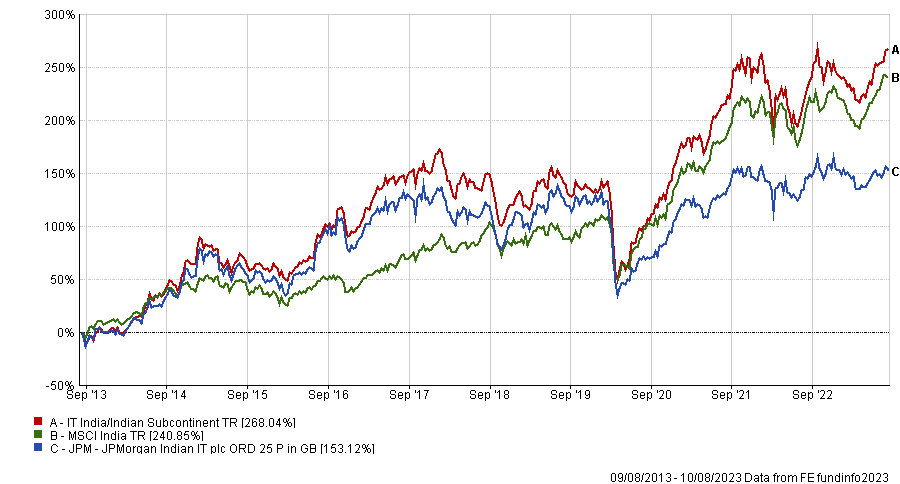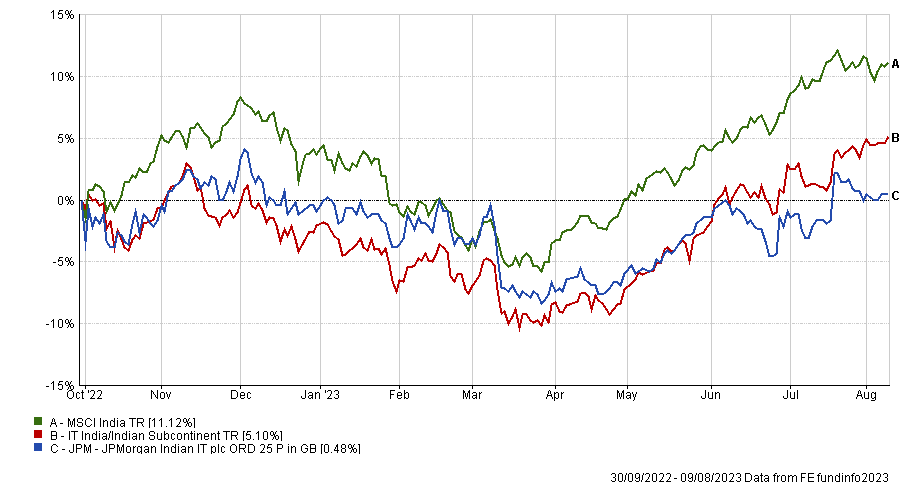Investors seeking exposure to growth opportunities in the fast-growing Indian market are likely to have been underwhelmed by JPMorgan Indian’s poor performance over the past decade, but it could be taking a significant turn for the better.
Returns were up 153.1% over the past 10 years, meaning investors would have been 87.7 percentage points better off by simply tracking the MSCI India benchmark index.
Nevertheless, MIGO Opportunities manager Nick Greenwood bought a position in the £612m trust earlier this year, saying that markets have severely underpriced it.
Total return of trust vs benchmark and sector over the past decade

Source: FE Analytics
What investors have failed to notice is that the managers who drove the trust into underperformance – Rajendra Nair and Rukhshad Shroff – have both retired and been replaced by a fresh team who have improved the trust considerably.
“What often happens when you get a change of management team at an investment trust is it continues to trade on the track record of the vehicle, not the track record of who's running it now.
“This is a classic example of that, where it was a very poor performer until the new team joined a few months ago.
“Rather than just mimicking their open-ended fund, they're using the investment trust structure properly and building a more concentrated, higher conviction portfolio than it has been in the past and it's performed reasonably well so far.”
Ayaz Ebrahim joined in 2020 followed by FE fundinfo Alpha Manager Amit Mehta and Sandip Patodia in September last year.
Together they have transformed JPMorgan Indian into “a much punchier portfolio than it was before,” and although it has some catching up to do before those changes take effect, the trust is out of the red and up 0.5% since they took charge.
Total return of trust vs benchmark and sector over the past decade

Source: FE Analytics
Thomas McMahon, investment trust research manager at Kepler, also noted how the trust’s portfolio has benefited from the previous managers.
However, he said “the refreshed team may well be what is needed to turn this around” and gives investors strong exposure to “one of the most exciting growth stories in global markets”.
“The core of the approach to management has remained the same for many years, but there has been some turnover recently in the chief personnel taking responsibility for the portfolio,” McMahon added.
“Having a fresh team at the helm could be what the trust needs to deliver some good performance after a disappointing period.”
Although the trust appears to have undergone some positive changes in recent months, Greenwood said its sizable discount has yet to catch up.
Shares in JPMorgan Indian are selling 18.3% below its net asset value (NAV), creating an opening for investors like Greenwood to jump in and buy at a bargain.
“People just look at the spreadsheets and see it's not performed well so it takes a while for the performance to feed through,” he said.
“It’s trading on the track record of the vehicle which is poor rather the current team which is quite good. The perception is that it’s still a poor trust, but reality has moved on.”
The current discount is disproportionately large and needs to be addressed urgently by the board, according to James Carthew, head of investment company research of QuotedData.
JPMorgan Indian will have a continuation vote at its AGM next year that will decide whether or not the trust continues running and there is “a serious chance that it will lose” if the discount does not lower significantly before then.
“The easiest fix would be for it to be much more aggressive on tackling its discount and, as the largest of the Indian funds, it can comfortably do this without becoming sub scale,” he explained.
“We’d like to see the board commit to defending a high single-digit discount of say 8%, as this would provide a decent uplift for shareholders today while giving comfort to investors that they can get in and out at sensible valuations.
“The current discount is far too wide for a portfolio of relatively liquid large-cap stocks and leaves it wide open to an attack by an arbitrageur.”
There are promising signs that performance is improving, but Carthew said it is “missing out on the exciting returns being delivered by small- and medium-sized companies” – the majority of JPMorgan Indian’s holdings (71.7%) are in companies with a market capitalisation of more than £10bn.
Performance is likely to improve all the same according to Greenwood, which shouldn’t make the task of shrinking the discount overly difficult.
Indeed, if reducing the bridge between the share price and NAV becomes a central focus for the board, investors may have a small window to buy JPMorgan Indian at its current discount.
It’s low valuation is not the only appeal though, Greenwood added. The trust pays shareholders 25% of its NAV every five years if it fails to outperform over that period.
That five-year cycle is coming to an end within the next 18 months and whilst returns are slowly improving, it is still trailing far behind over the sample period.
Greenwood said: “We're around three and a half years into one of those five year periods and it’s miles behind the curve, so unless things performs like an absolute train over the next 18 months, you're going to get a quarter of your money back. If you don’t, it's because the trust has performed exceptionally well.”





